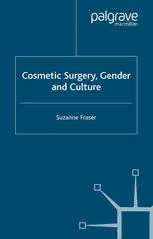
Cosmetic Surgery, Gender and Culture PDF
Preview Cosmetic Surgery, Gender and Culture
Cosmetic Surgery, Gender and Culture Suzanne Fraser Cosmetic Surgery, Gender and Culture This page intentionally left blank Cosmetic Surgery, Gender and Culture Suzanne Fraser Research Fellow National Centre in HIV Social Research, University of New South Wales, Australia © Suzanne Fraser 2003 Softcover reprint of the hardcover 1st edition 2003 978-1-4039-1299-2 All rights reserved.No reproduction,copy or transmission of this publication may be made without written permission. No paragraph of this publication may be reproduced,copied or transmitted save with written permission or in accordance with the provisions of the Copyright,Designs and Patents Act 1988,or under the terms of any licence permitting limited copying issued by the Copyright Licensing Agency,90 Tottenham Court Road,London W1T 4LP. Any person who does any unauthorised act in relation to this publication may be liable to criminal prosecution and civil claims for damages. The author has asserted her right to be identified as the author of this work in accordance with the Copyright,Designs and Patents Act 1988. First published 2003 by PALGRAVE MACMILLAN Houndmills,Basingstoke,Hampshire RG21 6XS and 175 Fifth Avenue,New York,N.Y.10010 Companies and representatives throughout the world PALGRAVE MACMILLAN is the global academic imprint of the Palgrave Macmillan division of St.Martin’s Press,LLC and of Palgrave Macmillan Ltd. Macmillan® is a registered trademark in the United States,United Kingdom and other countries,Palgrave is a registered trademark in the European Union and other countries. ISBN 978-1-349-51160-0 ISBN 978-0-230-50022-8 (eBook) DOI 10.1057/9780230500228 This book is printed on paper suitable for recycling and made from fully managed and sustained forest sources. A catalogue record for this book is available from the British Library. Library of Congress Cataloging-in-Publication Data Fraser,Suzanne,1967– Cosmetic surgery,gender and culture / by Suzanne Fraser. p. cm. Includes bibliographical references and index. 1. Surgery,Plastic–Psychological aspects. 2. Surgery,Plastic–Sociological aspects. 3. Self-perception in women. I. Title. RD118.F68 2003 617.9’5–dc21 2003045178 10 9 8 7 6 5 4 3 2 1 12 11 10 09 08 07 06 05 04 03 Contents Acknowledgements vii Abbreviations viii Introduction 1 Part I Tools 1. Toolkit for a Modest Witness 23 2. The Pressures of the Text: Intertextuality and Preferred Readings 41 Part II Discourses 3. Glossing Femininity: Women’s Magazines 61 4. Feminist Imaginary Bodies 97 5. The ‘Art’ of Cosmetic Surgery: Medicine, Metaphor and Meaning 122 6. The Regulation of Gender: Cosmetic Surgery, Regulatory Processes and Femininity 153 Conclusion 185 Notes 195 Bibliography 225 Index 237 v This page intentionally left blank Acknowledgements This book owes an immeasurable amount to the intellectual community in which it was produced. Thanks must first go to my University of Sydney doctoral supervisors, Alison Bashford and Denise Russell, for providing attentive and challenging readings of the thesis from which this book was produced. In addition, many colleagues and friends offered invaluable help and companionship. In particular, I want to thank Gill Dempsey, Sarah Howard, Megan D. Jones, Kirsty McKenzie, Celia Roberts, Fiona Rummery, Kerry Sanders and kylie valentine. Other friends and family helped make this book possible as well. Jo Barraket, Jane Caldwell, Michelle Fraser, Louise Fraser, Kathy Grattan and Justine Wilcox all provided friendship, humour and sympathy during the long writing process. Finally, I must also thank my partner of many years, John Jacobs, who supplied unfailing support for this project, intellectually, domestically and technically. If there is a limit to his generosity, patience and kindness, I have yet to encounter it. vii Abbreviations ACS Australasian College of Surgeons ASPS Australian Society of Plastic Surgeons ASPRS American Society of Plastic and Reconstructive Surgeons FDA Food and Drug Administration HCCC Health Care Complaints Commission (NSW) JAMA Journal of the American Medical Association MJA Medical Journal of Australia NH&MRC National Health and Medical Research Council TDEC Therapeutic Devices Evaluation Committee TGA Therapeutic Goods Administration viii Introduction ‘If it ain’t broke, change my nose anyway.’1 A young man confides in me shyly that during his adolescence, his ears pro- truded so much he had them surgically ‘pinned back’. In contrast, another man, a friend, tells me defiantly that he knows his ears make him look like ‘a car with its doors left open’, but he refuses to conform by having them ‘fixed’. In another context, an older woman, a colleague, informs me, again in confidence, that along with a bladder operation, she opted for a tummy tuck. There is no doubt that cosmetic surgery is by now a well known if not entirely accepted group of practices.2 Advertisements and articles on cosmetic surgery feature regularly in the popular media. Not only found in women’s magazines, this coverage now extends to television current affairs and ‘lifestyle’ programmes,3 radio pro- grammes,4 specially dedicated, magazine-style publications5 and other forms of media.6 Given that cosmetic surgery finds such rich expression in the media, its impact on culture needs to be understood as extending far beyond the experiences of those who actually undergo surgical procedures. This recognition inspires the two main questions examined in this book. First, what kind of impact is cosmetic surgery, through its representation as much as through medical practice, having on current understandings of gender? Here, various issues regarding gender are important, the most obvious being the pronounced asymmetry in cosmetic surgery practice, in that the great majority of surgeons are male and the great majority of participants female.7 By analysing four discourses – women’s magazines, medical texts, feminist work and regulatory material – this project will draw conclusions about the directions gender is taking through its interaction with cosmetic surgery. Femininity will be the main focus, although ques- tions of masculinity will also be considered. Related to this issue is my second line of inquiry, which deals with current questions around how the media is seen in contemporary cultural studies. Using the ubiquity of cosmetic surgery in the media as a resource, I inves- 1
